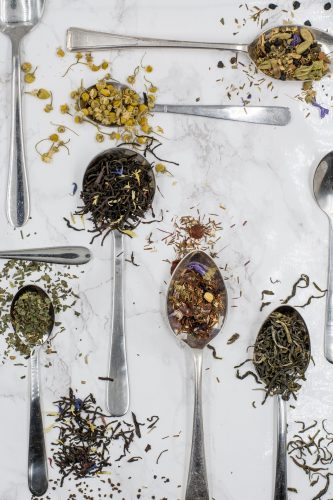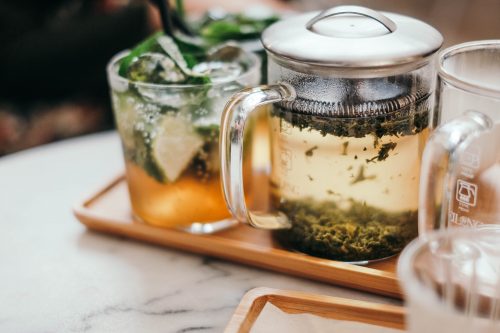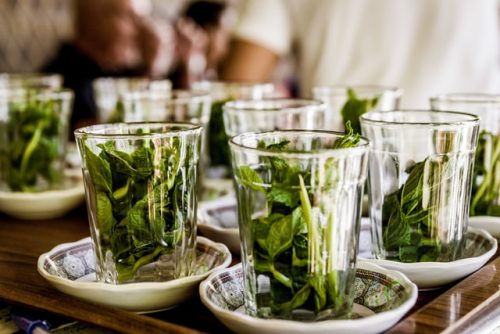Are you looking to reduce your caffeine intake? If so, you might be wondering what teas you can still incorporate into your diet. Fortunately, there are a number of good options. Let’s take a closer look at some great caffeine-free teas.
Should You Drink Caffeine Free Tea?

There are several reasons you might consider opting for caffeine-free tea. Some people are sensitive to caffeine. If you suffer from acid reflux or other gastrointestinal problems, it might be a wise decision to cut caffeine from your diet completely.
For others, it might come down to the time of day. Although many people enjoy the energy boost that comes with caffeinated teas, this can be troublesome later in the day. If, like many tea drinkers, you enjoy drinking a cup of tea before bedtime, you might find that caffeinated teas can keep you up all night. To avoid disrupting your sleeping schedule, you might consider drinking caffeine-free tea in the evening and nighttime hours.
Which Teas Are Caffeine Free?
Certain herbal teas are naturally free of caffeine. The best caffeine-free teas include the following:
1. Chamomile Tea
Derived from dried chamomile flowers, chamomile tea has long been used in herbal medicine. It’s most well-known for its calming effects, making it a popular bedtime tea. It has a fruity, floral taste that reminds some people of green apples with hints of floral.
Some of this caffeine-free tea’s other health benefits include:
- It can help you manage blood sugar levels.
- It may help aid in menstrual pain relief.
- It can lower your risk of osteoporosis.
- It offers anti-inflammatory effects, making it ideal for anyone who suffers from autoimmune diseases.
- It could help provide eczema relief due to its anti-inflammatory properties. To take advantage of this, it needs to be applied topically.
- It might help lower the risk of cancer.
- It can help alleviate cold symptoms.
This tea should be avoided by anyone with pollen allergies, as well as infants and young children.
2. Dandelion Tea

Dandelion tea comes from the flowers, leaves, and/or roots of the flowers (or weeds) many of us can find in our own backyards!
Due to its bold flavor profile, many consider dandelion tea to be the best caffeine-free coffee alternative. Its chocolatey, roasted flavor profile may remind you of a dark roast coffee.
Some of this caffeine-free tea’s potential benefits include:
- It packs a powerful punch of vitamins and nutrients. Most notably, it’s a good source of potassium.
- It offers natural diuretic properties, making it an ideal solution for bloating.
- It has been found to help boost liver function thanks to its polysaccharides content.
- It offers anti-inflammatory properties thanks to its tarasterol content.
- It might help stimulate our metabolisms, acting similarly to the weight loss drug Orlistat. It can also help aid in weight loss by removing excess water weight.
Though it’s generally safe for the majority of us, dandelion tea should be avoided by pregnant or nursing women or those with dandelion allergies. It can also interact with certain medications, including blood thinners and diuretics, so check with your doctor before drinking if you have a medical condition.
3. Ginger Tea
Made from the ginger root, this tea is known for its spicy, black pepper-like flavor. If the taste is too intense, you might consider adding lemon and/or honey to your ginger tea.
Ginger tea is known to offer the following potential benefits:
- It can help alleviate digestive troubles, including upset stomach, nausea, and morning sickness.
- It offers anti-inflammatory benefits.
- It helps support a healthy gut.
- It can help with blood pressure control.
- It can provide pain relief for headaches and migraines
- It’s a good source of antioxidants, which could help prevent cancer
Due to its ability to lower blood pressure, ginger tea should be avoided by anyone with low blood pressure or anyone taking blood pressure medications. It can also cause bloating and heartburn in some individuals.
4. Peppermint Tea

Known for its sweet, minty flavor profile, peppermint tea is a great option for anyone who’s looking for a caffeine-free tea. Not only does it taste great, but it offers plenty of health benefits. Some of these include:
- It’s a popular option for alleviating an upset stomach and nausea.
- It has been proven to help reduce bad breath.
- It might help relieve headaches and migraines.
- It can potentially help improve sleep and boost energy.
- It may help provide sore throat relief and could work as a decongestant, making it an ideal to drink when you’re suffering from a cold.
- It might help aid in weight loss. It’s believed to work as an appetite suppressant, and its flavor might help some manage their sweets cravings.
5. Rosehip Tea
Derived from the pseudo-fruits of the rose plant, this tea is known for its floral flavor that’s a mixture of sweet and tart.
Some of the benefits it has to offer include:
- It may help boost immunity thanks to its high Vitamin C content.
- It has been found to help lower blood glucose levels, making it ideal for diabetics.
- It may help promote weight loss, thanks to the antioxidant tiliroside.
- It can help reduce the signs of aging by fighting against sun damage and boosting collagen.
- It offers anti-inflammatory benefits.
Which Teas Contain Caffeine?
There are a number of teas that aren’t caffeine-free. They should be avoided by anyone who is looking for a decaf option. These teas include the following:
- Green tea
- Oolong tea
- Black tea
- White tea
- Pu-erh tea
- Guayasa tea
Decaffeinated Teas vs Caffeine Free Teas: There’s a Difference
Keep in mind that decaffeinated teas and caffeine-free teas are not the same. Decaffeination is a process that any tea can undergo to remove the caffeine from it. Therefore, it’s possible to find decaffeinated versions of tea that are naturally caffeinated, such as black tea, green tea, or oolong tea.
Whether you decide to opt for a soothing cup of chamomile tea, a spicy cup of ginger tea or a sweet cup of peppermint tea, there are plenty of great caffeine-free teas out there to choose from. Not only do all of these teas offer unique and good flavor profiles, but they also offer plenty of health benefits to anyone who is looking to cut back on their caffeine intake or eliminate it from their diet altogether.